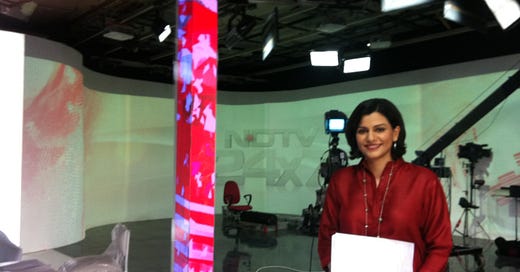
Nidhi Razdan, the NDTV anchor who famously sent BJP spokesman Sambit Swaraj out of her 9 pm show Left, Right and Centre when he accused the channel of having an “agenda” three years ago, says she would perhaps not do it were it to happen again.
In an interview with the writer and columnist Amit Varma for the podcast The Seen and The Unseen, Razdan recalls the June 2017 incident, when asked if there’s something wishes she hadn’t done or is not proud of, in her 21-year career.
“Sometimes I do have doubts about whether I should have thrown Sambit Patra out of my show, that day. The whole organisation stood by me for doing that. Prannoy Roy got raided by the CBI two-three days later, which was a coincidence. The BJP stopped coming on NDTV and that stands to this day.
“Most people tell me, ‘You did the right thing, somebody has to stand up and call these guys out,’ but to be honest, when I look back, I think maybe I shouldn’t have. Maybe I should have said my piece and let it go. That would have been more democratic of me rather than just tell him to leave. If I have to relive that, maybe I wouldn’t do it,” Razdan tells Amit Varma.
In the 80-minute podcast, Razdan, who announced 12 days ago she was changing direction and moving on to teach journalism at Harvard University, offers a nuanced explication of being a Kashmiri Pandit, whose heart bleeds for what Pakistan has done to her state, but yet can’t come to hate Muslims who are part of its warp and weft.
Along the way, Razdan, daughter of former Press Trust of India editor M.K. Razdan, also gives an up-close and personal view of why and how “TV journalism” has become an oxymoron in India today.
TV doesn’t let you breathe
“It’s constant. It’s exhausting. Your brain just doesn’t start working. Even the most anodyne news item which can pass off as a graphic or be put on the ticker, we need an OB (outdoor broadcast) and spend 10 minutes on it, and play it up, because the other channel is doing it. We are in that stage where everything is big.
It was nicer without social media
“You have to report for TV, put up a web-first story, do a Facebook Live, do an OB (outdoor broadcast), identify clips that can go viral. Plus you have to get your story right. That’s what reporting is like for a lot of young journalists. It’s not easy. It was much more fun back when one had the space and time to think.
Some channels are damaging society
“Some of the news channels you cannot call news channels. I used to laugh at them that you had these 10 windows and the anchor. I don’t think it is funny any more. What they are doing is putting targets on people’s backs. They are demonising entire communities. They whip up hysteria. They are doing far far more damage, not just to journalism, but our social fabric. It is dangerous now.
Much of today’s TV is contrived
“You call the fringe. You decide that a guy in a long beard represents all Muslims in India. He does not. You decide that some guy wearing a saffron robe in India represents all Hindus in India. He does not. So you pit two religions against each other. That’s why it has been reduced to a farce.
TRP ratings make no sense
“Even during the Coronavirus pandemic, if your ratings are reflecting that Republic and Times Now are your leading news channels, then I begin to wonder about the choices people are making. Those channels were not giving information, they were still doing Tabhlighi Jamaat 24 hours a day.
There is no obligation to be “objective”
“The 9 o’clock bulletin can be the editorial page of your channel. It is perfectly OK to take a stand. There are some inalienable truths and some stories which do not have another side. Politicians doing rallies in defence of rape accused and murder accused like Kathua is indefensible. There is no other side to the story. When somebody is lynched and killed, there is no other side to the story. It is wrong.
Why NDTV calls RSS on the channel
“Whether you like it or not, they are ruling the country right now. They have been elected by the people. They represent what the government of India thinks at the moment. We are not legitimising them. The legitimisation has come from the last two general elections.
Race to the bottom is not just on TV
“It is in the media as a whole, including print media. When you look at a lot of the reporting even in newspapers, it is government spin. It has become dependent on government press releases and handouts. I am tired of reading pieces about why ‘X’ politician is sleeping only four hours a day. I am tired of reading op-eds by ministers and opposition leaders with no nuance at all.
Audio clip: courtesy Amit Varma
Listen to the full episode: What happened to our journalism
Subscribe: The Seen and The Unseen with Amit Varma












Share this post